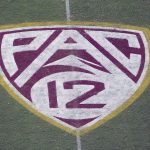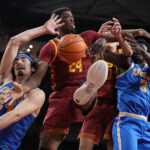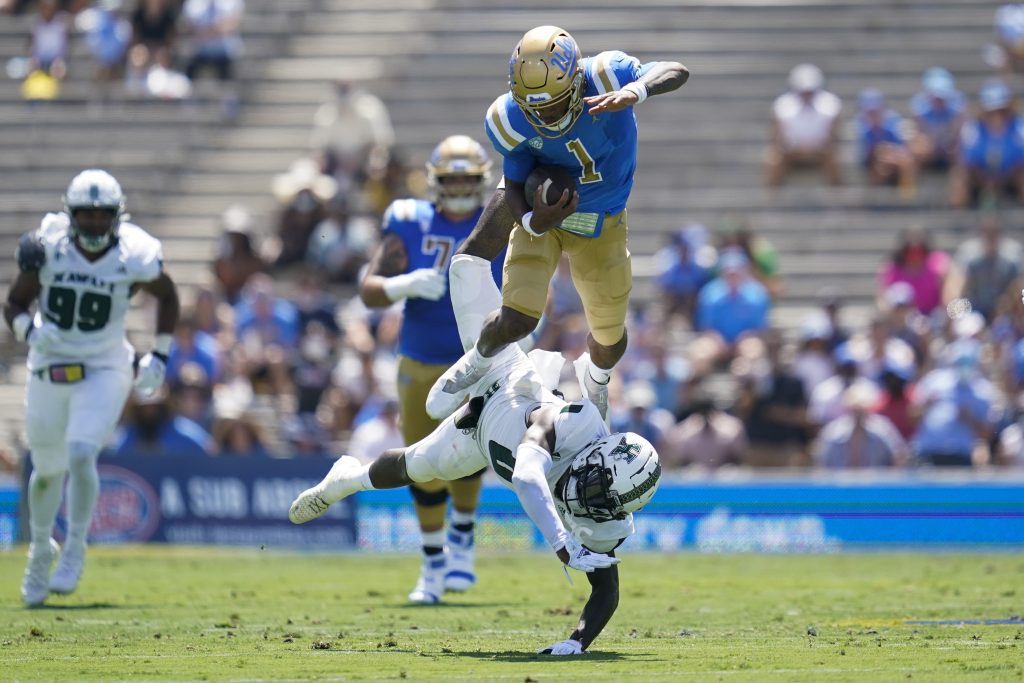UCLA will learn Wednesday just how messy its divorce from the Pac-12 could become when a report on the Bruins’ planned 2024 departure for the Big Ten is presented to the University of California Board of Regents.
Or maybe the Bruins won’t learn anything.
The situation is shrouded in secrecy — a notable twist given that the furtive nature of UCLA’s decision drew intense backlash from California Gov. Gavin Newsom.
As of 10 a.m. Tuesday, the impact report prepared by the University of California Office of the President (UCOP) had not been made public.
UCLA’s athletic department deferred questions to central campus, which passed the buck to UCOP, which directed the Hotline to the UC regents’ website for the posting of the report that has yet to be posted.
Will the regents vote on some aspect of the Bruins’ great leap eastward?
Will they attempt to block the move?
Will they instead opt to make UCLA’s departure as politically or financially painful as possible?
This much we know: The remaining universities in the Pac-12 will be watching closely, hoping — praying — that UCLA is somehow compelled to reverse course. (USC is joining the Bruins in the Big Ten but, as a private university, is not subject to regental oversight.)
Without a direct connection to the massive Southern California media market, the Pac-12 stands to lose at least 30 percent of its annual regular-season broadcast revenue — the equivalent of perhaps $10 million annually.
And the exodus might continue, with remaining members looking to the Big Ten (Washington, Oregon and Stanford) or perhaps the Big 12 (Arizona, ASU, Utah and Colorado) for lifeboats.
This much we also know: UCLA’s divorce proceedings have the potential to turn ugly.
The UCOP report is intended to justify the move to the Big Ten and explain why membership in a conference 2,000 miles away is, in fact, better for UCLA’s long-term athletic success.
As a result, the report likely will include criticism of the Pac-12 — specifically, the strategic miscalculations that have left the conference at a severe financial disadvantage relative to its peers.
In the Big Ten, the Bruins expect to double their annual media rights revenue: They could receive $90 million annually in distributions and provide their athletes with needed resources during an era of soaring expenses in college sports.
If, as many expect, college football and basketball players are eventually deemed pseudo-employees and compensated directly by the schools for services rendered, the Big Ten’s enormous revenue stream will allow UCLA to meet that demand.
As for the collateral damage within the UC system, the Bruins likely will argue that they aren’t fiscally responsible for Cal’s cash-strapped athletic department, which stands to lose millions in conference distributions without the L.A. media market.
And know this:
The powerful figures who govern Stanford, Washington and Oregon — from university presidents, trustees and regents to state legislatures and perhaps even governors — are keenly interested in the level of political pushback UCLA receives from Newsom and the UC regents.
Exactly how much pushback, and whether it comes Wednesday or at a later date, is one of many unknowns.
“This is one of the most important meetings in the history of the conference,” a source said. “What happens could impact decisions by other schools.”
Meanwhile, critics of UCLA’s move don’t lack for evidence, particularly when it comes to the welfare of UCLA athletes tasked with competing in a conference in which 14 of the 16 teams are located in the Eastern and Central times zones.
The football team will play just three or four Big Ten road games per season, with chartered flights and each trip requiring a maximum of two hotel nights.
But the athletes in UCLA’s storied Olympic sports have more games and longer seasons. For them, the travel demands will be substantial.
The air miles logged could increase by more than 150 percent annually, according to one industry analysis, with time on the road doubling even if the Bruins use chartered flights to half their games.
Another analysis pegged the average travel distance to Big Ten campuses as 1,700 miles.
And countless studies have connected extensive air travel to sleep deprivation and diminished cognitive function.
The report prepared by UCOP undoubtedly will highlight the financial benefits to UCLA that come with Big Ten membership, including the wherewithal to address an estimated $40 million in accumulated athletic department debt.
(The total was believed to be in excess of $100 million, but the Bruins reportedly will receive $67.5 million in a settlement with Under Armour, their former apparel partner.)
However, operating expenses will increase in the Big Ten. The Bruins are joining the wealthiest club in college sports — they can’t pinch pennies while rubbing elbows with Ohio State and Michigan.
UCLA seemingly will need to increase compensation for head coaches and assistants, particularly in the high-profile sports. (Rutgers, which joined the Big Ten a decade ago, allocates $500,000 more annually to its football staff than does UCLA, according to USA Today’s salary database.)
The Bruins currently spend approximately $7 million on travel annually for all sports, according to a pre-COVID report on expenditures. That figure could double in the Big Ten, and perhaps triple, depending on the number of chartered flights used.
An analysis of the move, which normalized UCLA’s expenses to those of an average Big Ten athletic department, estimated that administrative costs could increase by $15 million annually.
And if the Bruins are somehow forced by the regents to subsidize Cal, which could see Pac-12 media distributions drop by $10 million annually without the L.A. market, the revenue calculation might change substantially.
At this point, 47 days after UCLA declared divorce, the extent of the fallout remains murky.
Clarity will come Wednesday, courtesy of the regents.
Or maybe not.
Support the Hotline: Receive three months of unlimited access for just 99 cents. Yep, that’s 99 cents for 90 days, with the option to cancel anytime. Details are here, and thanks for your support.
*** Send suggestions, comments and tips (confidentiality guaranteed) to pac12hotline@bayareanewsgroup.com or call 408-920-5716
*** Follow me on Twitter: @WilnerHotline
*** Pac-12 Hotline is not endorsed or sponsored by the Pac-12 Conference, and the views expressed herein do not necessarily reflect the views of the Conference.
Related posts:

(AP Photo/Ralph Freso, File)
Wilner – Here comes Newsom: Governor roasts UCLA for lack of transparency in Pac-12 to Big Ten move, vows UC regent action Pac-12 survival: UC Board of Regents plunges into the details of UCLA’s pending departure for the Big Ten
Pac-12 survival: UC Board of Regents plunges into the details of UCLA’s pending departure for the Big Ten

(AP Photo/Mark J. Terrill)
Business of Sports – No, UCLA and USC won’t take their NCAA Tournament units to the Big Ten Pac-12 football: The Hotline’s picks for individual awards and the all-conference teams
Pac-12 football: The Hotline’s picks for individual awards and the all-conference teams
Jon Wilner
Jon Wilner has been covering college sports for decades and is an AP top-25 football and basketball voter as well as a Heisman Trophy voter. He was named Beat Writer of the Year in 2013 by the Football Writers Association of America for his coverage of the Pac-12, won first place for feature writing in 2016 in the Associated Press Sports Editors writing contest and is a five-time APSE honoree.
